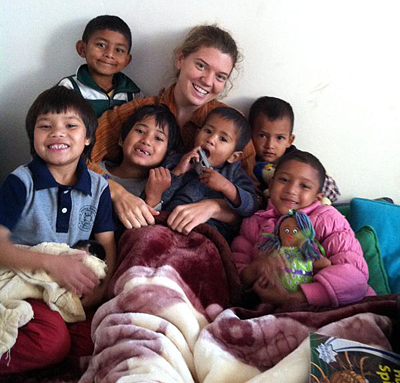
UPDATE 12/6/15: Maggie Doyne is THE CNN HERO OF THE YEAR! CONGRATS, MAGGIE AND BLINKNOW!
UPDATE 11/18/15: 2015 CNN HERO OF THE YEAR MAGGIE DOYNE! Congratulations, Maggie!
UPDATE 10/8/15: Maggie is a Top 10 CNN Hero of 2015…she needs your vote to become the Hero of the Year
UPDATE 4/25/15: From Maggie on Facebook about the earthquake that struck Nepal: “Everyone is okay in Surkhet. The kids and staff felt tremors and followed emergency procedures. We are waiting to hear news from our friends across the rest of the country. Thank you for checking in on us and please pray for Nepal.”
By Patricia Caso/December 5, 2013
Maggie Doyne is thrilled any time one of her forty kids, 3 to 16-years-old, call her “Mom!” Taking a gap year after high school, she wound up as Founder and Director of Kopila Valley Children’s Home and School in Surkhet, Nepal. She is realizing her dream to create a loving home, school and community for orphans and abused children.
“The shame and hopelessness I witnessed was monumental. I found this horror was reality for 80 million kids worldwide. How did I not know about this? I had to do something and I had to do it now.” Maggie Doyne
Wise beyond her twenty-seven years, I was fascinated by this young woman’s passion and courage and wanted to find out how she was able to house and educate so many children in such a poverty-stricken community. In the midst of a busy schedule of meetings on a trip to the U.S., I caught up with her by phone….
EYE: At 18, you delayed going to college and were volunteering at a Nepalese refugee camp in India. At what point did you know you weren’t going back home to New Jersey?
MAGGIE: I met a Nepalese refugee, Sunita, in the Indian camp. She offered to show me where she came from, and I was curious to find out why so many Nepalese children, who were civil war refugees, ended up in India. I had no idea what I was getting into. I ended up busing for 2 ½ days and hiking with her over more two days to a remote part of the war-torn Himalayas.
Kopila Valley Children’s Home from Maggie Doyne on Vimeo.
I saw poverty on a scale I had never seen or imagined before. There was a whole desperately poor community of kids, mostly young girls, breaking rocks into gravel by the riverbed. They hauled bags on their backs to make a dollar for food. Every day Heema, who was about 6 or 7-years-old, carrying heavy pounds of rocks on her back, would always engage me with the Nepalese “Hi!”
Why wasn’t she at least in school? The answer was that it cost too much–$5.00! Other child porters had no family, no home. What have we done as a human family that people should live like this? It was the first time I ever felt ashamed to be human.
The hopelessness I witnessed was monumental. I later found this horror was reality for 80 million kids worldwide. How did I not know about this? I had to do something and I had to do it now. I thought what if I just started with Heema?
MAGGIE: I saw the future and worked backwards. I wanted to create it. I called my parents to get my $5,000 from my babysitting money to buy land and build a home. I wanted these kids to have a safe home, health care and education.
Many don’t make it past 5-years-old. I was 19 when I launched my project. Nisha was the first child I adopted. Now I have 40 kids living in Kopila Valley Home and over 300 enrolled in school.
Working primarily with Surkhet community, then with donations, grants and volunteers from around the world, I was able to build this beautiful slice of hope.
EYE: What do you mean by working the future backwards?
MAGGIE: If we want to have a healthy, blossoming, peaceful world, then we need healthy, blossoming well taken care of children with good childhoods. That was clear. I saw kids having a childhood like I had, with enough food to eat, a family, a home base and a really good education.
That was my goal. I wanted to flip these kids’ world around with love through having a home and a family. Everything I started to create was based on that.
“I have found you have to trust your inner voice, follow your heart. If you are doing work that you love, everything else tends to fall into place.”
EYE: What is the meaning behind the name Kopila?
MAGGIE: It is the Nepali word for “bud.” The local community organization also helped choose the word because we thought it represented what children are all about. They resemble a bud; if a bud gets everything it needs, it will bloom magnificently.
EYE: You deferred college to find your “inner self.” What have you found?
MAGGIE: I have found you have to trust your inner voice, follow your heart. If you are doing work that you love, everything else tends to fall into place. Before I was 18, I thought I had to follow the same old beaten track that everyone was going down. Until I stepped out of that bubble of fear that I have to be this or I have to be that way, I didn’t realize that the world opens up to you.
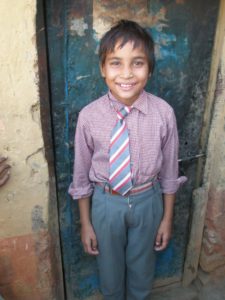
EYE: How does your youth work in your favor?
MAGGIE: I left home when I was 17, was 18 when I put the wheels in motion, and 19 when I was in Nepal. I was definitely a young person. The mindset is that you can do anything, that nothing stands in your way. I think young people are visionaries and visual. They don’t worry about things.
EYE: Did you worry about staying in touch with people back home? You seem to have found social media very helpful.
MAGGIE: Social media is the reason I was able to share the message with the world. For the first three or four years I was living in Nepal full-time in a very remote region in the Himalayas. The only way to communicate with family and friends was through a blog.
Slowly it became a Facebook page, then we went on Twitter, and Instagram followed. Anyone can now instantly see what’s going on day to day on the ground. That connection is so important. People feel that Nepal is not that far away or that the life of a child there is not that different from life with my own child here.
If you look at the goodness in social media, it is about humanity. We all have similar joys and similar sorrows. I want to paint a picture of what it means to be a child in the developing world, what it looks like.
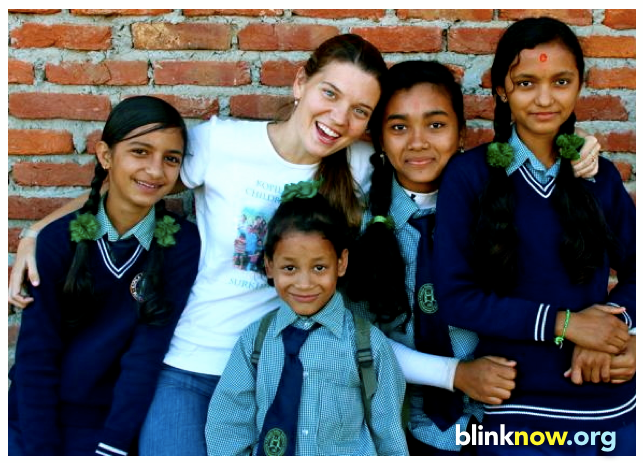
EYE: What is the meaning and purpose of your BlinkNow Foundation?
MAGGIE: I believe in the blink of an eye we can all make a difference. BlinkNow Foundation is a vehicle to share my ideas with other young people. It’s a grassroots organization to empower young people to become pioneers in developing their own solutions to world poverty. The site targets underdeveloped war-torn countries where extreme poverty, high rates of illiteracy, disease, child labor and unstable governments exist.
People can also find ways to volunteer, donate to Kopila Valley efforts and find out what is going on with me and the kids. I named the organization BlinkNow because, for me, it was an instant decision to stay in Surkhet with all these children. No doubt in my mind. How could I ever go back?
My life was just changed forever. In my case, I picked up, moved, started raising money in the blink of an eye. I think we all have to live our lives that way.
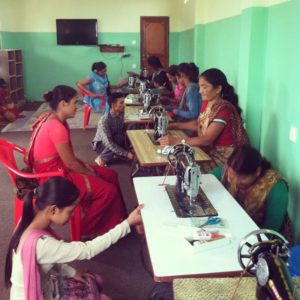
EYE: What are you focused on at Kopila Valley now?
MAGGIE: We are concentrating on organic growth and approaching problems at their source. We built Kopila Valley Home to keep the children safe and housed. Then we needed to give these kids a school so they could have a quality education. Education is a catalyst for change. We also established a nutritious lunch program to address hunger.
A medical clinic was created to address the infections and diarrhea that they were battling at home, which became a community outreach clinic. A few months ago, we launched a women’s center because too many issues involved women such as violence against them, equality and so on.
We are also trying very hard to make Kopila Valley a locally sustained project from what we eat, to the medicine we use, to what we wear, to the building materials, everything.
EYE: What concerns do you have about girls in school?
MAGGIE: If it were up to the Nepali cultural and religious tradition, they would give preference to their sons. In 2004, girl enrollment was 26% and in 2012 it went up to 72%. If you talk to a woman in Nepal over the age of 30, it is very unlikely that she has any form of education at all, or that she can hold a pencil and write her name. Additionally, girls face challenges with trafficking and child labor.
So we wanted to swing the pendulum in a different direction and give priorities to them. I’ve been a big follower of the The Girl Effect, which is all about including girls in education, health and economic investment. Women and girls tend to stay within the community whereas men tend to leave. Women reinvest a lot of their income back into their family, passing it on to their own children.
“The toughest is the fear that something bad is going to happen to them. Are they going to make friends? Are they going to do well in school?”
EYE: Speaking of children, what are the toughest and most rewarding parts of parenting all these children?
MAGGIE: The toughest is the fear that something bad is going to happen to them. Are they going to make friends? Are they going to do well in school? I worry about their happiness and their health. At the end of the day, when you’re totally tired and all you want to do is sleep and somebody is having a temper tantrum, it’s trying to keep cool and patient.

Juggling and managing time is another concern so that they get my best self, my most quality self. I want them to see me as being totally present with them. The most rewarding thing is definitely watching them grow into their own person, their own thoughts, their own ideas, their own successes.
At some point you just look at them say, “They are really a person.” When they first come to you, they are little beings who are suffering and struggling. Then they have their favorite music; they read books; they make jokes. They hug you and tell you that they love you.
EYE: How do you manage to keep balanced with all this work?
MAGGIE: I really had to learn how to disconnect. My home life, my work life and everything that I care about is all wrapped up together. I read. I try to meditate. I try to get into yoga, but I am a terrible yogi. Every now and then I take in a good movie. I stay in touch with friends and run.
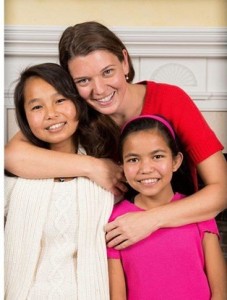
EYE: What is your latest news?
MAGGIE: Two of my children are actually coming to New Jersey! Nisha will be living in Mendham and going to school in Morristown, NJ. Kabita will be here for a medical operation.
Back home at Kopila Valley, I’ll be working on a new high school and campus so we have to develop a curriculum, vocationally-based, with the social and economic skills they will need.
EYE: Do you have any final thoughts for young women looking at you as a role model?
MAGGIE: I tell women of all ages all the time to focus on what is important, not to get distracted with the silly, the mundane. It starts with wanting to be better ourselves, loving ourselves this moment and then supporting those in need of many of the same things. Stick with your heart; do things you love.
Surround yourself with people who make you feel good. Trust your path, your journey, your strengths and your wisdom, your inner voice. How cool are we, the young women in and of the world, who can transform into anything, be anything, do anything!
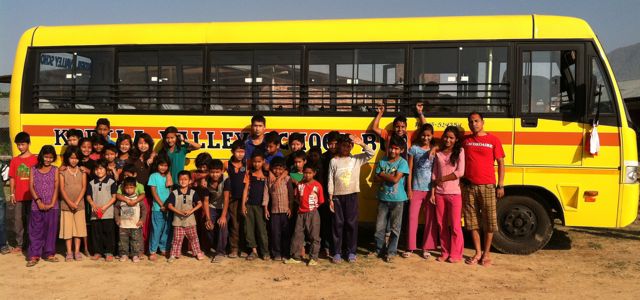
EYE: Maggie your vision is transformative. I encourage readers to check out BlinkNow to learn even more. Thank you for your time and continued growth and success to you and your Kopila Valley family!
Photos: Courtesy of BlinkNow Foundation
###
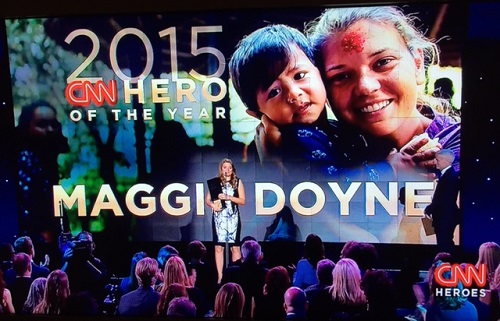
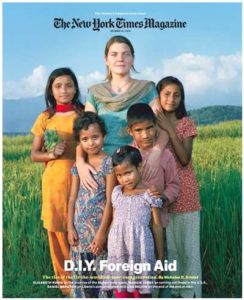



Leave a Reply